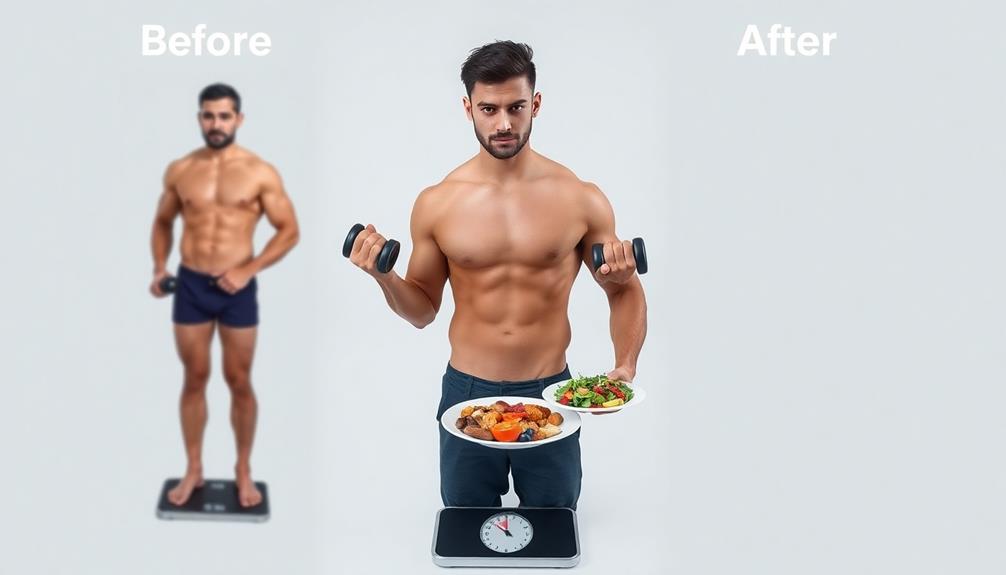To build muscle at maintenance calories, focus on body recomposition. Calculate your maintenance calories accurately, then optimize your macronutrient ratios with sufficient protein intake. Implement progressive overload in your workouts, gradually increasing weights or reps. Time your meals strategically, ensuring adequate protein distribution throughout the day. Prioritize recovery and sleep, aiming for 7-9 hours nightly. Consider supplements like protein powder, creatine, and HMB to support muscle growth. Consistency is key, as muscle building takes time. By following these principles, you'll be on your way to transforming your physique without drastic weight changes. The following sections will provide more detailed insights into each aspect of this process.
Core Insight
- Consume adequate protein (1.6-2.2g per kg of body weight) to support muscle growth and recovery.
- Implement progressive overload in strength training to continually challenge muscles.
- Optimize macronutrient ratios, focusing on sufficient protein and carbohydrates for energy.
- Prioritize quality sleep and recovery to allow for muscle repair and growth.
- Consider supplements like creatine monohydrate and HMB to enhance muscle-building efforts.
Understanding Body Recomposition

Body recomposition is a way to build muscle and lose fat at the same time, without changing your weight. It works well for people who are new to exercise, getting back into it after a break, or have more body fat to lose. To do it right, you need to eat enough protein and keep your calories steady. You also need to lift weights to grow muscle and keep what you already have. At the same time, your body uses fat for energy, so you lose fat.
It's a slower process than bulking up and then cutting fat, but it's a healthier way to improve how you look without your weight going up and down a lot. Before starting, make sure you understand the rules and terms of any fitness or nutrition plan you want to follow. This will help you stay safe and get better results.
Calculating Maintenance Calories

To figure out how many calories you need to maintain your weight, you can:
- Multiply your weight in pounds by 14-16 if you're a man or 13-15 if you're a woman.
- Use the Harris-Benedict equation, which considers your age, height, weight, and gender.
- Try online calculators on trusted fitness sites by entering your information.
- Track what you eat and your weight for a few weeks to see your maintenance level.
- Get a metabolic test done by a professional for the most precise number.
After you know your maintenance calories, think about adding EAA powders to your food plan. They can help you build and repair muscle without adding a lot of calories.
Optimizing Macronutrient Ratios

Calculating your maintenance calories is just the first step. To build muscle without gaining too much fat, you also need to dial in your macronutrient ratios. That means getting the right balance of protein, carbs, and fat in your diet.
Protein is key for muscle growth and recovery. Aim for 1.6 to 2.2 grams per kilogram of body weight per day. Carbs fuel your workouts, so target 3 to 5 grams per kilogram of body weight daily. Fill in the rest of your calories with healthy fats, which keep your hormones in check.
Here's a good starting macro ratio for muscle building:
- Protein: 30-35% of calories
- Carbs: 40-50% of calories
- Fat: 20-30% of calories
You may need to adjust these numbers based on how your body responds. HMB supplements can give you an extra edge by boosting muscle protein synthesis, especially when taken around your workouts. Just make sure you're nailing your nutrition first.
Implementing Progressive Overload

To build muscle, you need to challenge your body in the gym, even if you're eating just enough to maintain your weight. The key is progressive overload, which means slowly making your workouts harder over time.
You can use progressive overload in a few ways:
| Method | Example |
|---|---|
| Use heavier weights | Add 5 lbs to your bench press |
| Do more reps | Go from 8 to 10 reps per set |
| Do more sets | Do 4 sets instead of 3 |
| Use better form | Focus on moving through the full range of motion |
Pick one method to start with and use it in your workouts. Once you get used to it, try adding another. Know that progress takes time, so be patient and stick with it. Keep a record of your workouts to make sure you're always pushing yourself a little more and getting better over time.
Meal Timing and Frequency

When building muscle, meal timing and frequency matter less than consistency and finding a routine that fits your lifestyle. Spread your protein intake across 3-5 meals per day, aiming for 20-40 grams of protein each time. This keeps your body in a muscle-building state. Consider adding post-workout smoothies for extra convenience and nutrition after exercise.
Eating a protein-rich meal 1-2 hours before and after working out can boost muscle growth and recovery. But don't worry too much about exact timing – your total daily protein is more important. Try different meal schedules to see what works best for your energy levels and schedule.
Recovery and Sleep Importance

Recovery and sleep are key for building muscle, especially when you're eating just enough to maintain your weight. Make sure to get 7-9 hours of quality sleep each night. Sleep helps balance your hormones and repairs your muscles.
Take 1-2 rest days every week to let your muscles recover. Spend 10-15 minutes per day stretching to improve flexibility.
On rest days, do light activities like walking or yoga. This gets more blood to your muscles without putting too much stress on them. Try to relax and avoid stress, since being stressed all the time can slow down muscle growth and recovery.
Supplements for Muscle Growth

Supplements aren't necessary for building muscle, but they can help when you're eating just enough to maintain your weight. Protein powder is a common choice that makes it easier to get enough protein each day. Creatine monohydrate is another supplement that has been well studied. It can help you gain strength and muscle safely and effectively. HMB supplements are also becoming more popular for their potential to improve muscle growth and recovery. They come in different forms to meet individual preferences.
Think about taking omega-3 fatty acids, which may help with muscle recovery and reduce inflammation. Beta-alanine can boost endurance during intense workouts, and citrulline malate may improve blood flow and reduce fatigue. Vitamin D and zinc are important for muscle growth and overall health, especially if you're not getting enough from your diet.
Frequently Asked Questions
Can You Build Muscle While in a Calorie Deficit?
You can build muscle in a calorie deficit, but it's challenging. Focus on high protein intake, progressive resistance training, and adequate rest. It's most effective for beginners or those returning to exercise after a break. Results may be slower.
How Long Does It Take to See Noticeable Muscle Gains?
You'll typically notice muscle gains within 6-8 weeks of consistent training. However, visible changes can vary depending on your starting point, workout intensity, diet, and genetics. Stay patient and focused on your routine for best results.
Should I Do Cardio While Trying to Build Muscle?
Yes, you should incorporate cardio while building muscle. It'll improve your cardiovascular health and endurance. Just don't overdo it, as excessive cardio can hinder muscle growth. Aim for 2-3 moderate sessions weekly to complement your strength training.
Can Genetics Limit My Ability to Build Muscle?
Yes, genetics can influence your muscle-building potential. They affect factors like hormone levels, muscle fiber composition, and metabolism. However, don't let this discourage you. With proper training and nutrition, you can still make significant gains regardless of your genetic makeup.
Is It Possible to Build Muscle Without Counting Calories?
Yes, you can build muscle without counting calories. Focus on eating protein-rich foods, consuming enough overall, and following a consistent strength training routine. Listen to your body's hunger cues and adjust your intake accordingly.

